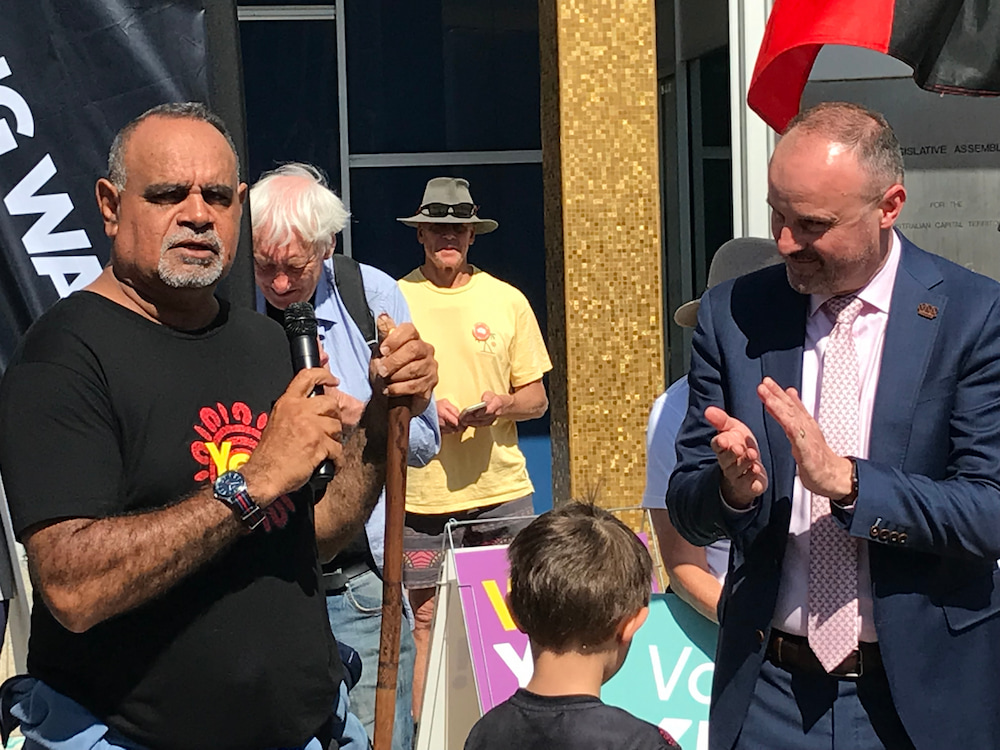Former Aboriginal footballer Michael Long OAM arrived in Canberra last week, Wednesday 13 September, on his ‘Long Walk’ from Melbourne to raise support for the Indigenous Voice to Parliament.
Mr Long walked to Parliament House the next day, completing an 800 km, 19-day trek that began at Melbourne Town Hall on 27 August. Prime Minister Anthony Albanese joined Mr Long on the last leg of the Long Walk.
Nearly 20 years ago, in November 2004, Mr Long began a walk from Melbourne to Canberra to meet with then-Prime Minister John Howard about issues Aboriginal people faced: education, employment, health, housing, and the Stolen Generations.
“In the 19 years since that meeting, the gap between Indigenous and non-Indigenous Australians has not closed,” Mr Long said, reading a letter to the Prime Minister from former Labor Senator Nova Peris. “In some areas it’s widened… That’s why we set out from Melbourne again 19 days ago.
“A Yes vote in the referendum on the Voice to Parliament will give Indigenous people the self-determination that we asked for all those years ago. It will give this nation a new approach to closing the gap. And it will allow this nation to embrace the fullness of our history.”
The Voice referendum will be held on Saturday 14 October. Voters will be asked to vote ‘yes’ or ‘no’ to this question: “A Proposed Law: to alter the Constitution to recognise the First Peoples of Australia by establishing an Aboriginal and Torres Strait Islander Voice. Do you approve this proposed alteration?”
Mr Albanese said the Voice was “an advisory committee whose only power is the power of its ideas. If they’re good ideas, they’ll be accepted. If they’re not good ideas, they won’t be accepted by parliament and by government in order to get better results. If we do the same thing through the same method, in the same way, we should expect the same outcomes.”
“Why we got behind the Voice and the Yes campaign this year is to have a Voice and to be enshrined in the Australian Constitution, to have a say on the issues that we face,” Mr Long said. “When you look at closing the gap, it’s gone on for too long, and it has to stop … This is the time as a nation we need to come together.”
Mr Long was officially Welcomed to Country on Wednesday morning by Ngunnawal elder Aunty Violet Sheridan, then met at the ACT Legislative Assembly by leaders of all three ACT political parties and many MLAs.
“It shows that we’re loved here – I’ve seen that along the way, and the people we’ve met – Canberra is so progressive,” Mr Long said.
“It is a significant moment at a very significant time for our country, to come here to Ngunnawal country,” ACT Chief Minister Andrew Barr said.
Mr Barr acknowledged the presence of Canberra Liberals leader Elizabeth Lee, a member of the Liberals for Yes movement, and ACT Greens leader Shane Rattenbury.
“I acknowledge the strength of support for the Yes campaign right across the political spectrum here in the ACT,” Mr Barr said.
“It demonstrates the progressive community that Canberra is. I am hearing that the Yes campaign has the highest proportion of volunteers from the ACT per capita than any other part of the country. You couldn’t have come to a better place, Michael. Thank you for your leadership, friendship, and support for the community.”
“People are here from different parties; it shows that we can come together as a nation … we want to move in the same direction,” Mr Long said.
Earlier this year, Mr Barr committed to the ACT recording the highest Yes vote in the country.
Mr Long expects to walk into Parliament House at 6.30am. A barbecue will follow.
Jeremy Hanson opposes the Voice
Canberra Liberals MLA Jeremy Hanson said he would be happy to chat to Mr Long about his perspective – “It’s very important as Australians that we have a civil debate and listen to each other” – but he will vote No.
“I think that increasingly as Australians and Canberrans looked at the proposal, that is where a lot of people are ending up,” Mr Hanson said.
A poll this week showed that only 43 per cent of voters supported the Voice, down 20 percentage points from a year ago – not enough to meet the 50 per cent of the vote across Australia and in four states. That includes about half of Canberrans, Mr Hanson estimates.
“I don’t think this is the right proposal for Australia; I don’t think it’s the right proposal for addressing Indigenous disadvantage,” Mr Hanson said.
“We all want to see Indigenous disadvantage being addressed” – Mr Hanson listed the issues of health, incarceration, and education – “But [people] don’t think [the Voice proposal] will actually achieve that.”
In his opinion, the details are inadequate; he is concerned that it will lead to activists pushing for treaty and reparation; and it will create division. Nor, he believes, are Australians comfortable with “putting something into the Constitution that separates people by racial identity”.
Several Indigenous people – including Warren Mundine AO and Senator Jacinta Nampijinpa Price – oppose the Voice, Mr Hanson noted.



